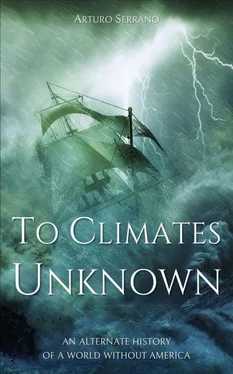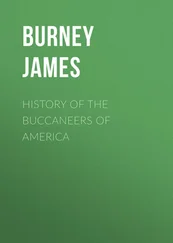“Last year, you gave me this as a gift. Today, I’m repaying your kindness.” At another signal from him, a banner was raised, and the desert rumbled with the sound of cannon fire. An entire section of the Wall was destroyed, and when Verbiest was able to hear again, his attention was drawn toward the voice of Xiaobo, who was finishing her ascent to the top of the hill and was pointing in a direction he hadn’t looked.
He turned around and the chill of dread returned. Behind the next hill, in a well-coordinated formation, ten thousand copies of his toy advanced toward the Wall. Each of them was the size of an elephant, each of them carrying an impressive cannon, each of them propelled by its own red-hot furnace.
“What is this?” he demanded of the Emperor.
“Your little invention has kept my smiths busy, Father. But I couldn’t have paid them without help from your friends in Copenhagen. Their traders are quite serious about paying us better prices than yours.”
By now Verbiest was finding it hard to breathe, outrage and terror disputing control over his voice. “What is the purpose of this? What are you going to do with those monstrosities?”
“Haven’t you heard? We’ve been fighting the Manchus at the northern border for years. My father appointed very competent generals, but your idea will get rid of the problem for good.”
“This is not the northern border, Your Majesty. You’re not telling me everything.”
“You’re clever, Father. That’s right: this division is marching westward. I’m tearing down this wall, all of it, because China’s no longer going to hide. We will once again expand and conquer.” He pointed beyond the demolished watchtower and added, “That way lie the lands of the Khan. After we take them, we’ll advance to the lands of the Shah.”
“Why? What did they do to you?”
“It’s not their fault,” said Zhenzui with unnerving serenity. “They’re just in the way.”
Verbiest was afraid to ask, but he had to know. “In the way to where?”
The Emperor turned to look at him and smiled with condescension. “You know to where, Father. To my holy city. The true faith won’t be restored until I capture Jerusalem back from the infidels.”
The Jesuit’s eyes filled with tears of rage, and not wishing to bear the sight of that impostor’s face anymore, he stood in horror watching row after row of steel beasts fire at the rest of China’s most famous defense and march through the rubble toward the boundless steppes of Asia.
The impossible has never happened, and the possible should cause no wonder.
Cicero,
On Divination
Even one random event would mean that Providence does not completely rule the world.
Saint Augustine,
On Eighty-Three Various Questions
Morning, November 14 (Gregorian), 1755
Cádiz
The hall allowed the four men little space around the huge wooden structure in the center. It looked like two ship hulls nailed together, two halves made to face each other in such a way that it wasn’t clear which side was intended to be up. One extreme was entirely made of glass and shaped as a hemisphere, which suggested that was meant to be the front, but the rest of the machine was incomprehensible to the master builders of the Iberian Royal Navy College. It had no masts, no sails, and no obvious waterline; its external design didn’t allow a crew to walk on it, let alone perform any of the ordinary tasks of sailing. But its inside, which had been studied during the process of taking it apart, bringing its pieces into the hall and reassembling it for display there, was quite elaborate: it had half a dozen decks, including one that could accommodate thirty rowers. The technique of its construction was ahead of all the shipbuilding knowledge of Europe, and no one could decipher how it was intended to sail.
The tall, blond sailors captured with it were suspected to be Dutch, which would go a long way toward explaining Dutch maritime supremacy. But so far they had refused to speak.
In the hall where the strange vessel was being displayed, Don Juan Gerbaut y Poruci, holder of the dual office of President of the House of Trade of the Indies and General Intendant of the Royal Navy, looked from his table at the richly tapestried walls and prayed that they would prove sumptuous enough to receive the monarch. He thought his office might have been a more appropriate venue for the occasion, but it had no space for that wooden beast. The surprise and speculation aroused by its discovery had almost quieted the talk of the much graver event that had occurred earlier that month.
On the Day of All Saints, the Iberian peninsula had been hit by an earthquake, and shortly later by a gigantic wave that had swallowed the coast.
Gerbaut looked to his left, where a Frenchman whose presence was due to explicit royal request stood examining a globe encased in glass. Gerbaut recalled him being a mathematician, but didn’t know much more. He had introduced himself as Louis Godin.
To his right was a slightly less explicable presence: a young doctor, more boy than man, by the name of José Celestino Mutis, sent over by the Cádiz College of Surgeons as the only one of their members not too busy resetting broken bones to give their report on the state of rescue operations. He was hunched over another table, reviewing his notes, which he’d done so many times he’d probably memorized them already.
At the opposite side of the hall, studying the far end of the wooden structure, was the Governor of Cádiz, Don Antonio Azlor, who’d had the worst past couple of weeks of them all. The city was in ruins. The reconstruction work could take decades and the Iberian Crown had no money to pay for it. It had become an accepted fact of life that the galleons bringing silver from the Indies could vanish at any time, for no reason.
Gerbaut had the suspicion that the machine he was looking at could be that reason.
His own role in the meeting was clearer: he’d been ordered to gather news from all Iberian possessions affected by the earthquake. His sources had sent him word that even the coast of Ireland had suffered from high waves. The fact that this demonstration of God’s wrath had hurt Catholic nations the most was still fodder for discussion among theologians. But while they worked to ascertain the meaning of this omen, there were still bones to mend and houses to rebuild.
The sound of horses outside made the four of them stand erect, and Gerbaut’s eyes glanced out the window to confirm that it was, in fact, the royal carriage that had arrived, which he signaled to the other men in the room with a quick nod. They stayed immobile for the next ten minutes until a page opened the doors of the chamber and announced that it pleased Her Majesty to regale them with her presence.
Maria Theresa Walburga Amalia Christina of the House of Habsburg, Queen of the Iberian Union, Naples, Sicily, Sardinia, Croatia, Bohemia, Hungary, Galicia and Lodomeria, Archduchess of Austria, Princess of Transylvania, Duchess of Lorraine and Milan, Grand Duchess of Tuscany, Sovereign of the West Indies, Holy Roman Empress and Sanctified Protector of the True and Eternal Faith, paraded her hand around the room for all to kiss as they kneeled, and when formalities were over, she sat at the head of Gerbaut’s table, wordlessly forcing him to find another seat, and began immediately, “How many died?”
Gerbaut knew not to flinch at her atrocious Spanish. “We’ve counted twelve hundred across the entire Andalusian coast. Two hundred died in Cádiz alone. Sixty were counted in Huelva, four hundred in Ayamonte—”
“How is the College of Surgeons doing?”
Читать дальше












